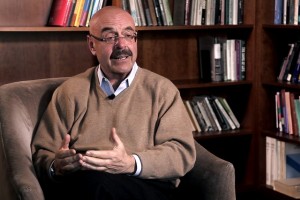School Education and Mental Ability
Psychologist Christopher Winship on the causal effects of schooling, similarities between athletics and intell...
It’s quite clear that there are both clinical and theoretical reasons for why it’s important to study music in developmental disorders. An obvious clinical application is therapy. Speech therapy often adopts aspects of music therapy, especially in trying to fine tune auditory processing and possibly extend memory in children developmental disorders. So there is a direct link between empirical studies and therapy. The empirical studies can provide a scientific basis that therapists can use to develop different kinds of approaches to working with these children.
If we think about neurodevelopmental disorders we’ve got to think about them in different contexts in the way we would think about adults with brain damage. These children are processing music in an atypical way from the beginning of life, so we might find that these children love music, have an affinity to music, listen to music but the kind of things that they’re encoding about music, the kind of memories that they’re laying down may be different to the kind of memories we’d see in a child who is typically developing.
So if we think about disorders like specific language impairment where we see difficulties with language, we can see very similar difficulties within music and this speaks to theories of music that talk about shared resources. We’ve got a very important model by Aniruddh D. Patel in America, that talks about how syntax in music and syntax in language share cognitive and neural resources. The neurodevelopmental research can speak to that, for example, with SLI. The problems we see processing syntax, we see during the processing musical harmony. That’s just one example of how we can take theory forward in terms of music and in terms of developmental disorders.
Concerning the ideas about associations between music and language, we know that when we’re processing emotions in speech and in music we rely on very-very similar psychoacoustic cues. We can look at whether or not in children who are not doing very well at recognizing emotions in voices (we see that in children who are visually impaired) are we going to see similar kinds of effects in music. If we find that musical emotions are very much easier to recognize than vocal emotions we might be able to use that in the therapeutic context.
So I think one of the things that has become much more apparent in recent times is that it’s relatively rare for a child to have one neurodevelopmental disorder. When we look, for instance, at the autism we see lots of children with motor difficulties, so we see lots of developmental coordination problems in these children, we see comorbidity with other kinds of disorders as well, we see language problems, so, for instance, some trouble with autism have specific language impairment.
If we look at children who have visual and auditory impairment we see fairly high levels of autism. We even see some children with Williams syndrome meeting diagnostic criteria for autism. So we see these very mixed patterns of difficulties in a lot of these children. I think that we’re seeing an increasing tendency to compare developmental disorders against each other and that’s very helpful in terms of thinking about which factors are unique to this disorder and which factors do we see across both disorders. A good example of that is, if we look at specific language impairment and dyslexia, we do see proportionate people who have both disorders but we do see that those disorders can be discrete and that they have specific profiles associated with them.
We have good evidence now that music therapy’s very useful with autism, so we have good randomized trials showing that music therapy can help with the core disabilities in communication. We also have excellent work from America showing the use of music to elicit speech in nonverbal children with autism. We know that music works to reduce anxiety in some developmental disorders. If we think about what music can do for us, it can do so much because we can use music to help us emotionally, we can use music to enable us to bond with other people when we’ve got social communication difficulty. If we come right down to the building blocks of music we can use music to fine tune auditory perception which might help with phoneme discrimination, for example. So in that case having music lessons and learning how to analyze pitches more effectively generalizes to language domains so that we can see some knock-on effects for children that are having difficulties with language.
We might be able to use the rhythmic aspects of language to help children with motor impairments and of course children that have got problems with motor functioning. If we can motivate that child to start learning a musical instrument, we might be able to help the child develop fine motor skills. We also might also use music as a medium because it’s more emotionally engaging, the child might be more willing to engage in quite burdensome practising hand movements when you have problems in motor skills in respect to music than in respect to other kinds of therapeutic approaches.
I think there’s probably a huge amount of what we don’t know about neurodevelopmental disorders and music. Some groups of children with neurodevelopmental disorders are extremely difficult to test. For example, I once carried out a study into emotional recognition with children with Down syndrome. The children didn’t do very well at all, but I don’t doubt for a second that these children are extremely responsive to music, I’ve seen this so many times. The experimental paradigm required the child to listen to the music, look at some pictures and decide which picture matches the music. The child was much more interested in looking at my face and it was very very difficult to get the child to do this.
So from the empirical evidence so far we can’t say that children with Down syndrome are totally alive to music but they probably are. It is similar in the case of children with autism that are intellectually low functioning, I think all the evidence is that they really are very-very responsive to music. But the kind of paradigm we use in psychology means that we can’t really test this very well. We also know that children can have problems with some aspects of music. For instance, Williams syndrome is characterized by pattern processing problems, but these children still love music. Are these children listening to music in a different kind of way, music switching timbre, it has pulse, it has tempo, rhythm – all these different components show that it might be that not being able to encode melody isn’t all that much of a problem. It’s still extraordinarily rich despite these kinds of impairments.
With children with SLI we’re seeing auditory memory problems, we have carried out research showing very poor memory for music in SLI. But we have seen some emotional effects of music, music will prime certain kinds of responses which does suggest that it is still having some kind of an effect. So again, we don’t have paradigms that are sensitive enough to be able to show us what’s going on with these children. Of course, if we use a paradigm that disadvantages those children because it requires some aspect of tension, or memory, or motor control we could very easily conclude that these children are not doing very well when in fact it’s really us that aren’t doing very well in terms of developing paradigms that are suitable to these groups. So I think we need to really harness all of our imaginative skills to start thinking about music in this kind of children.

Psychologist Christopher Winship on the causal effects of schooling, similarities between athletics and intell...

Molecular Biologist Greg Towers on HIV discovery in San Francisco, antiviral drug therapy and current areas of...

Geographer Anson Mackay on threats to fresh water, the dangers of dead zones in the lakes and how people can a...